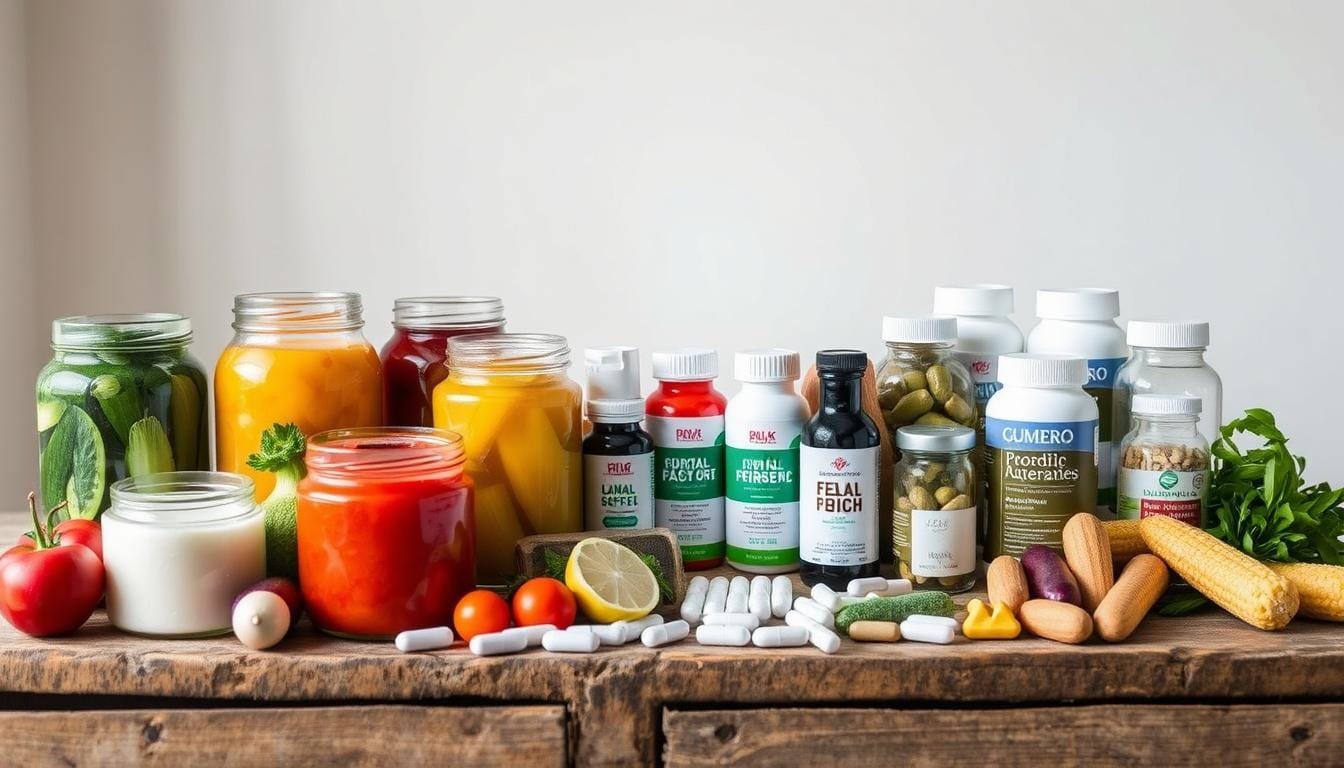Currently Empty: RM0.00
Gut health is a hot topic in Malaysia, with more people seeking ways to improve digestion and overall wellness. But with so many options available, how do you choose between natural sources and packaged solutions? Both offer benefits, yet they differ in microbial content, consistency, and convenience.
Many struggle to decide which option fits their lifestyle. Traditional choices like yogurt or kimchi provide live bacteria, while capsules offer a precise dose of probiotics. The key lies in understanding what works best for your body.
Wellness Concept, a trusted name in digestive wellness, helps Malaysians navigate this choice. This article compares microbial diversity, scientific backing, and practicality—so you can make an informed decision for your health.
Key Takeaways
- Gut health awareness is growing in Malaysia.
- Natural sources and supplements differ in microbial content.
- Wellness Concept provides expert guidance on digestive wellness.
- Compare diversity, research, and convenience before choosing.
- Learn more about probiotic benefits.
Introduction
More Malaysians are exploring ways to boost digestive wellness naturally. With growing awareness, the choice between traditional options and modern science becomes key. Each offers unique health benefits, but understanding their differences ensures better results.
Clinical research spanning 30+ years confirms the efficacy of specific microorganisms in supporting gut balance. However, many store-bought items lose up to 68% of live cultures during processing. This inconsistency makes standardized solutions appealing.
“Fermented foods vary widely in microbial content, making their benefits unpredictable.”
Wellness Concept bridges this gap with rigorously tested formulations. Their evidence-based approach ensures reliable strains and doses tailored for Malaysian diet needs. For optimal gut health, combining both natural sources and targeted solutions often works best.
Whether you prefer age-old traditions or lab-backed precision, the goal remains the same: a happier, healthier gut. The next sections dive deeper into how each option stacks up.
What Are Fermented Foods and Probiotic Supplements?
Malaysia’s rich culinary heritage includes age-old practices that naturally support gut balance. Traditional items like tempoyak (fermented durian) and budu (fish sauce) harness spontaneous fermentation, creating diverse microbes. These foods offer live cultures but vary widely in potency.

Fermented Foods: Nature’s Probiotics
Homemade versions often contain richer microbial profiles than store-bought ones. For example, artisanal kimchi may host 100+ bacterial strains, while mass-produced yogurt might have just 3-5. However, consistency is a challenge—temperature and time alter results.
“Spontaneous fermentation creates unique microbial ecosystems, but predictability is limited.”
Probiotic Supplements: Targeted Microbial Support
Lab-made options provide precise doses, like the clinically backed DSM 17938 strain (tested in 1,800+ trials). These deliver 10-50 billion CFUs per dose and remain stable without refrigeration. Below, a comparison of key traits:
| Feature | Homemade | Commercial Supplements |
|---|---|---|
| Microbial Diversity | High (50-100+ strains) | Low (1-10 strains) |
| Shelf Stability | Requires refrigeration | Room-temperature safe |
| Dose Consistency | Variable | Standardized (e.g., 20B CFUs) |
While traditional choices celebrate cultural roots, supplements offer reliability for specific health goals. The best pick depends on individual needs and lifestyle.
Health Benefits Compared
Scientific studies now reveal how different approaches impact digestive wellness. Traditional options and modern formulations each offer unique health benefits, supported by decades of research. Understanding these advantages helps Malaysians make informed choices for their gut balance.
Natural Microbial Advantages
Traditional preparations like kimchi deliver vitamin K2 and diverse strains from spontaneous fermentation. A single serving may contain:
- 100+ bacterial varieties
- Natural enzymes for lactose digestion
- Bioavailable nutrients like B vitamins
However, potency varies between homemade and commercial versions. Daily consumption (2+ servings) is often needed for consistent effects.
Precision-Formulated Solutions
Lab-developed options like Wellness Concept’s DSM 17938 provide targeted support. Key features include:
- 42% reduction in antibiotic-associated diarrhea (per clinical trials)
- Standardized 20B CFU doses per capsule
- Strain-specific immune benefits (L. reuteri)
“Effective probiotics require specific strains with proven clinical benefits.”
Evidence-Based Insights
Recent findings from NCCIH show particular efficacy for IBS management. The table below compares key research outcomes:
| Approach | Benefit | Study Size |
|---|---|---|
| Traditional options | Improved lactose digestion | 1,200 participants |
| Formulated solutions | 42% diarrhea reduction | 1,800+ trials |
Wellness Concept’s strain-specific formulations bridge this gap, offering Malaysian consumers the best of both worlds.
Drawbacks and Considerations
Every gut-friendly option comes with unique challenges to consider. While both traditional and modern approaches offer benefits, being aware of limitations helps Malaysians make smarter choices. What works for one person might cause discomfort for another.
Natural Options Aren’t Perfect
Store-bought versions often lose potency during processing. Studies show 60% of commercial sauerkraut lacks live cultures. Other concerns include:
- High sodium: Pickled items may contain 300-500mg sodium per serving
- Histamine content: Aged items can trigger reactions in sensitive individuals
- Inconsistent results: Homemade batches vary in microbial content
Supplement Caveats
Lab-made solutions have different considerations. Southeast Asia’s supplement market lacks strict regulation, making quality unpredictable. Wellness Concept stands out with:
- Third-party testing for purity and potency
- Strain-specific clinical backing
- Transparent CFU counts per serving
Overuse may cause temporary bloating as gut bacteria adjust. Those with specific conditions should consult healthcare providers before starting new regimens.
| Cost Factor | Traditional Options | Quality Supplements |
|---|---|---|
| Weekly Expense | RM15-25 (kimchi, yogurt) | RM8-12 (monthly average) |
| Storage Needs | Refrigeration required | Stable at room temperature |
| Dose Reliability | Variable | Precise CFU counts |
“Quality matters more than quantity when selecting microbial support.”
Smart consumption means balancing cultural preferences with scientific assurance. Whether choosing grandma’s recipes or lab-tested capsules, understanding limitations leads to better outcomes.
Choosing the Right Option for Your Needs
Finding the best gut-friendly option depends on individual needs and lifestyle. Some thrive on traditional choices, while others benefit from lab-backed precision. Here’s how to decide.
When to Prioritize Natural Sources
Traditional options shine for culinary enjoyment and micronutrients. Homemade kimchi or yogurt delivers:
- Diverse strains from spontaneous fermentation
- Natural prebiotics (fiber) to fuel gut bacteria
- B vitamins and enzymes for digestion
ISAPP recommends 1-10 billion CFUs daily for maintenance. Daily servings help maintain balance.
When Lab-Made Solutions Excel
Supplements suit specific scenarios like travel or antibiotic use. Key advantages include:
- Stable potency without refrigeration
- 42% fewer digestive issues during antibiotics (per trials)
- Precise dosing for targeted health goals
“Strain-specific probiotics show consistent results in clinical settings.”
Combining Both for Synergy
A hybrid approach often works best. Try this regimen:
- Morning: Supplement (e.g., 20B CFUs)
- Dinner: Fermented side dish (kimchi, tempeh)
Prebiotics in natural foods enhance probiotic effects. Wellness Concept offers personalized consultations to tailor plans for Malaysian diet needs.
Wellness Concept: Your Partner in Gut Health
Wellness Concept brings science-backed solutions to Malaysia’s gut health needs. With 15 years of microbiome research, they combine tradition and innovation for optimal results.

Their products are developed with ISAPP-certified labs, ensuring adherence to global standards. This partnership guarantees:
- Strain-specific formulas backed by clinical trials
- Refrigerated delivery to preserve live cultures
- Third-party tested potency (20B CFUs per dose)
“Collaboration with the international scientific association ensures our formulations meet rigorous efficacy benchmarks.”
Malaysians can access free gut health assessments via WhatsApp (+60123822655). Services include:
- Personalized stool testing
- Custom probiotic blends
- Dietary plans for digestive balance
Business hours: Mon-Fri 9:30am-6:30pm, Sat-Sun 10am-5pm. Whether you seek prevention or targeted support, Wellness Concept tailors solutions for every gut.
Conclusion
Optimal gut health isn’t one-size-fits-all—it’s about finding what works for you. Consider your goals, lifestyle, and budget when choosing between traditional options and lab-backed solutions.
Wellness Concept bridges this gap with evidence-based formulations. Their strain-specific blends offer reliable health benefits, tailored for Malaysian diet needs.
For best results, combine both approaches under expert guidance. Reach out via WhatsApp (+60123822655) for personalized advice. Extended weekend hours cater to busy schedules.
FAQ
What are the main differences between fermented foods and probiotic supplements?
Fermented items like yogurt and kimchi contain live cultures naturally, while supplements offer specific strains in controlled amounts. The former provides nutrients, while the latter targets precise health needs.
Which option is better for gut health?
Both support digestion, but whole-food sources also deliver vitamins and fiber. Supplements may be preferable for those needing higher microbial counts or particular strains.
Are there risks associated with consuming these products?
Some people experience bloating initially. Supplements may interact with medications, so consulting a healthcare provider is wise before starting.
How do I know if I need supplements instead of food sources?
Those with digestive issues, weakened immunity, or specific conditions might benefit more from supplements. Always seek professional advice for personalized recommendations.
Can I take both together for better results?
Yes! Combining them can enhance gut diversity. Just monitor your body’s response and adjust intake as needed.
What does research say about their effectiveness?
Studies show both improve microbiota balance. Clinical trials highlight supplements for targeted relief, while natural options promote overall wellness.
Do all fermented items contain probiotics?
Not always. Pasteurization kills live microbes, so check labels for “active cultures” to ensure benefits.



